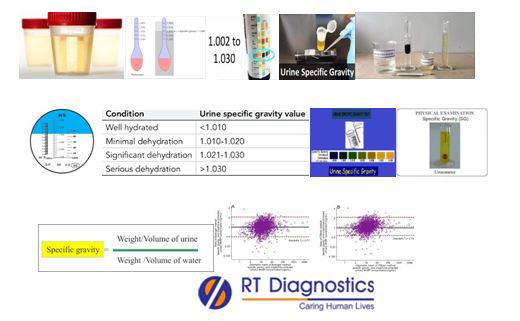Specific Gravity - Urine:
Why Specific Gravity - Urine Test ?
CLINICAL INFORMATION
Specific gravity (also known as relative gravity) is the ratio between the densities – density of an object with reference to a standard substance (standard eg. water being standard for liquid, hydrogen being standard for gases etc). Specific gravity of urine urinalysis is performed to measure specific gravity of urine to determine its content (i.e concentration of all chemical particles in the urine – electrolytes and urine osmolality). This urine concentration test provides specific gravity of urine and is an indirect method to assess the ability of kidneys to balance water content and its ability to eliminate (excrete) metabolic end products. This test compares the density of the urine to the density of the water (quick test to assess the ability of kidney to dilute urine i.e concentrated urine implies that either the kidneys inability to function efficiently or the patient is consuming less water). This test in indicated in pathologies such as nephrogenic diabetes, diabetes insipidus (excretion of excess water in urine), kidney disorders, ADH disorders, hypovolemia, hypervolemia, aldosterone disorders, pituitary disorders, edema, medications such as diuretics etc. This test result helps the physician to instruct the patient to follow certain guidelines according to existing pathology to revert back to normal physiology. For instance to consume more water (sometimes with electrolytes) – eg. dehydration due to excessive sweating, vomiting or diarrhea etc, to restrict water intake (cases such as during medications – diuretics etc), Anti-diuretic hormone (medication to help concentrate urine) etc. Causes of imbalance in fluids in urine include heart failure, kidney disorders, dehydration, infection, diarrhoea, vomiting, renal arterial stenosis (narrowing of the artery to the kidneys), sugar in the urine (diabetes mellitus), SIADH, diabetes insipidus (excretion of excess water in urine), excessive consumption of fluid than body’s requirement (over-hydration). Signs of electrolyte imbalance include feeling weak or fatigued, nausea, vomiting, lack of appetite, muscle cramps, confusion etc. If unhealthy conditions are left untreated for chronic stages, it can lead to complications such as permanent damage to organ systems and its subsequent consequences. Increased urine specific gravity may be due to conditions including Addison’s disease (lack of adrenal secretion), hypernatremia, heart failure, dehydration, renal artery stenosis, hypovolemic shock, diabetes mellitus, SIADH etc. Decrease in urine specific gravity may be due to conditions including diabetes insipidus (excretion of excess water in urine), renal tubular necrosis, intake of excessive fluids than the body’s requirement (over-hydration), kidney failure, hyponatremia, pyelonephritis etc. Additional tests include the osmolality test (it evaluates the ability of kidneys to dilute or concentrate urine, with osmolality being the index of concentration) which helps to diagnose certain conditions. Other tests include dyes (contrast media) used for CT or MRI scans etc.

General Instructions:
Sample Requirement: Specimen - Urine Sample. Test Preparation: None.
NOTE - Sample for specimen collections may vary based on the patient’s condition/cases according to the patient’s presenting complaints/signs or symptoms:
SPECIMEN REQUIREMENT (Special or Rare Cases) - As instructed and guided by Physician / Clinician / Pathologist / as per Laboratory’s requirements, according to procedures and protocols.
This Multi-Specialty Clinical Referral Laboratory RT DIAGNOSTICS provides precise and accurate tests with an extensive range of testing services to the medical centres to help in the diagnosis and identification of pathology in the test specimens for infectious diseases and also to evaluate the function of organ systems of the patient. It prevents further complications and helps to stabilize and restore health to near normalcy at the earliest without delay.



